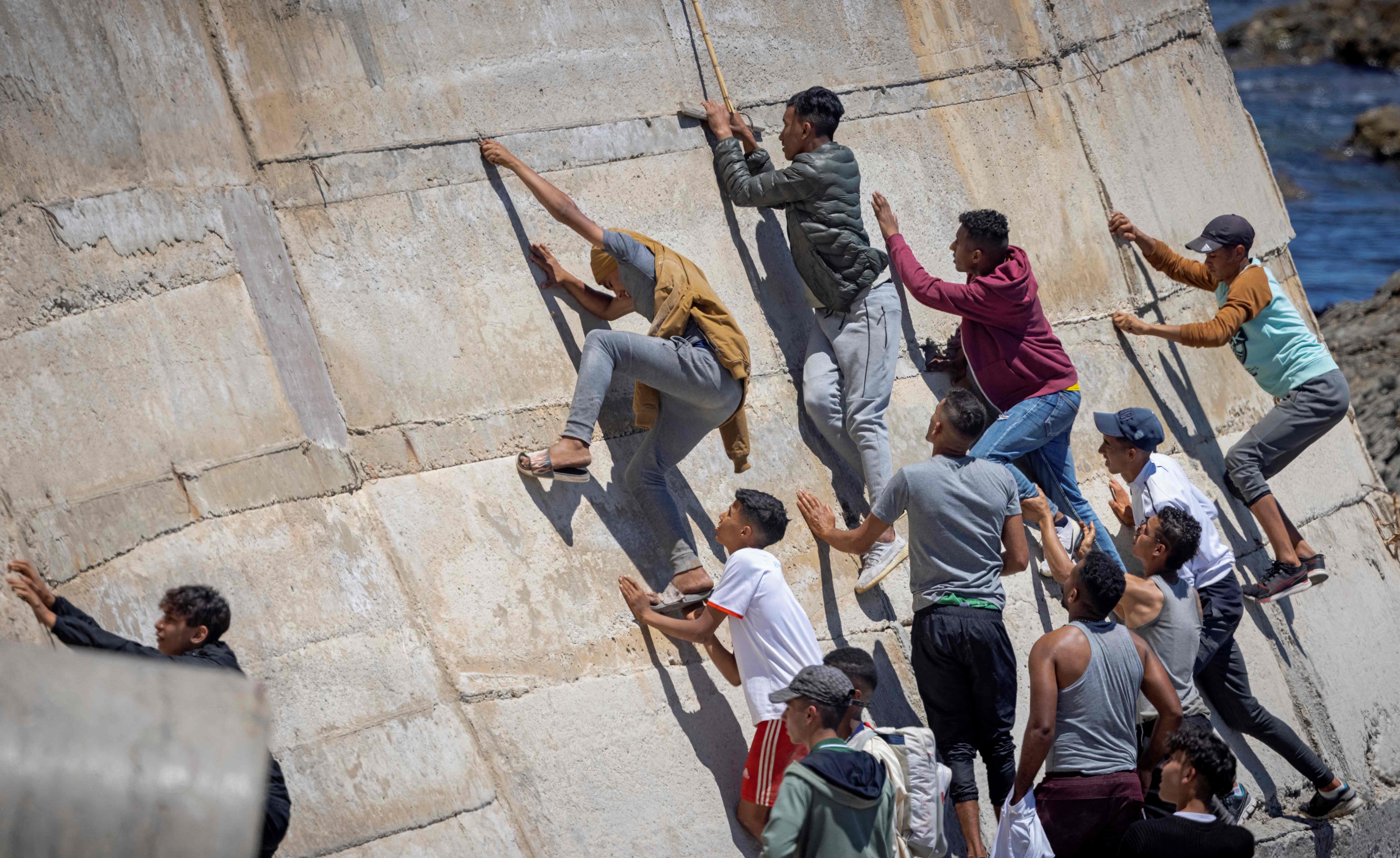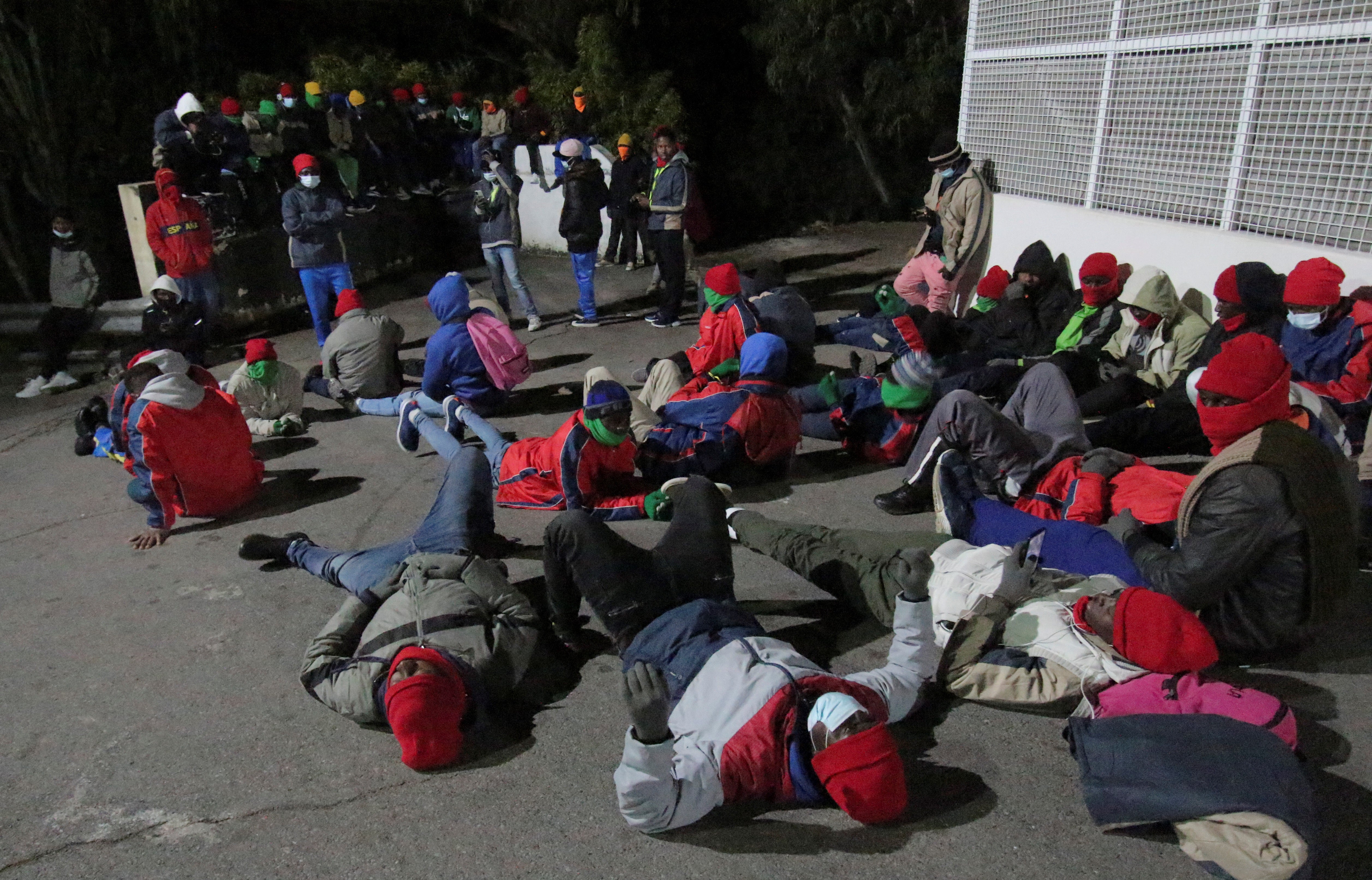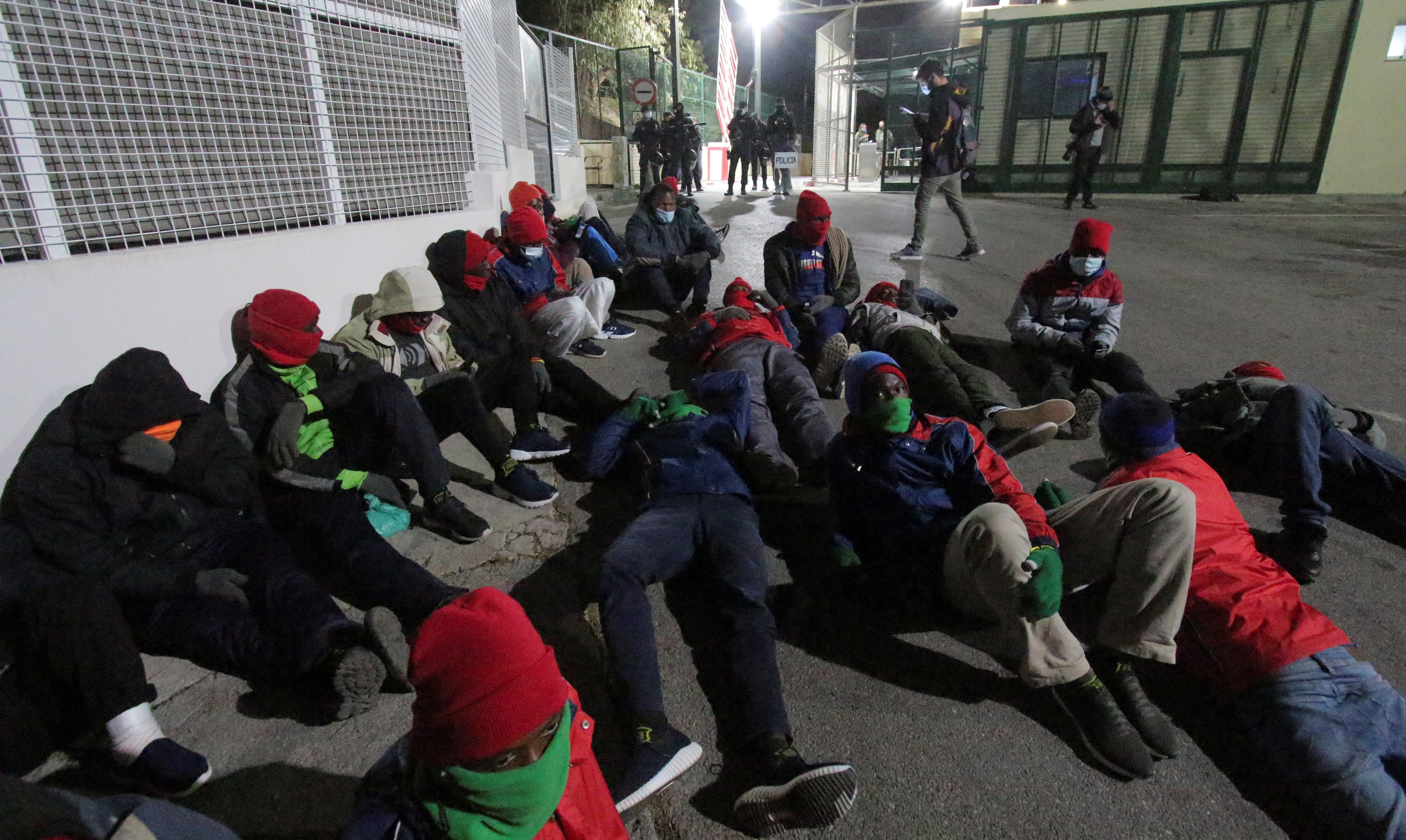A long-awaited reform brings some hope for migrant minors in Spain
Previously, Spanish law set unaccompanied migrant minors up to fail as soon as they turned 18. Now, there is a chance of integration, reports Rupert Cornwell prize winner Thomas Graham

Sitting in a cafe in Madrid, Ismail admitted he got lucky.
Six years ago, when he was 16, he left home. Home was Castillejos, a Moroccan city next to Ceuta, one of the two Spanish enclaves in north Africa. One morning he slipped across the border, hidden among the thousands that crossed every day. He didn’t go to the centre for minors in Ceuta but slept on the street, waiting for the chance to stow away on a ship to the mainland.
He tried once, and he succeeded.
When he got off the boat in Algeciras, in Andalucia, he went to the police station and made himself known as an unaccompanied minor. Spanish law entitles such children to state guardianship. Ismail joined thousands of others in the network of residential centres across the country.
“In very little time, something like two weeks, I managed to get to the peninsula,” Ismail said. “What I went through was difficult enough. But in comparison to others, it was quick.”
Ismail spoke Spanish in a slow, deliberate, composed way. It became clear, as he talked, that luck wasn’t the only thing that got him where he is today: established in Madrid, working for Cruz Roja, a humanitarian organisation, and co-founder of Exmenas, a NGO that helps former unaccompanied minors in Spain. He planned his path carefully.
In Castillejos, Ismail came from a structured home. His family, like most others in the city, made a living from the border trade with Ceuta. Neither he nor his siblings wanted for basic things. He studied, and he worked a little on the side. “I was leading a normal but limited life,” he said.
At 16, those limits were closing in on him. He knew his family couldn’t afford to send him to university. He tried to save money, thinking he would pay his own way, but he couldn’t make it work.
“And that’s where the idea of emigrating came from,” Ismail said. “To take the risk to get to Europe, to the unknown.”
He never told anyone in his family what he was planning. He waited until his mother was away travelling – she was always wary that her children might try to leave like this – then went out one morning with nothing but school books, a pen, and the clothes he was wearing.
“Because in theory I was going to college. But I did not return.”
Once in Spain, Ismail pursued education. This was not straightforward: the centres for minors vary greatly in conditions and resources. The minors aren’t always told what they can do, nor guided towards education. Some turn 18 without much Spanish.
But Ismail managed to get his secondary school qualification, even though it meant repeating much he’d already learned in Morocco. Then he did a course in inter-cultural mediation and started volunteering with Cruz Roja. Soon, they gave him a job.
He turned 18 with his papers in order, and, four years on, he has managed to keep them that way.
Ismail’s path to integration required luck, planning and commitment, from an unaccompanied minor in a foreign country. It is a success story – and it is exceptional.
Most such minors end up working informally or even living on the street shortly after turning 18, Ismail said, because Spain’s immigration law effectively condemned them to such an outcome. His organisation, and many others, had been campaigning to change it for years. In October 2021, the reform was finally passed.
A look at the law as it was explains why Ismail’s outcome was exceptional. Unaccompanied minors faced bureaucratic hurdles almost from the moment they crossed the border.
It was often a problem getting any papers to start with. When an unaccompanied minor arrives in Spain, the local government is obliged to provide documentation, including a residence permit.
But the law allowed the administration nine months to begin this process. These nine months were intended to confirm it was impossible to repatriate the minor. But as a result, many that arrived not long before their 18th birthday would become adults and be turned out of their centre before they received any documents.
Those that did get their documents often struggled to renew them – something they needed to do every year – because they had to demonstrate a certain level of income. For the first renewal, it was around €500 a month. But thereafter, it was more than €2,000 a month. In Spain, few young people earn that much. For those fresh out of a centre for unaccompanied minors, it was a tall order.
This difficulty was compounded by the fact that their residence permits did not include a work permit, which meant that they would be working in the informal economy. That tends to imply longer hours and less pay.
Getting a work permit was a separate challenge. This required finding someone willing to offer them a full-time contract for at least a year, and who was willing to go through the paperwork. Again, and particularly given the high level of youth unemployment in Spain, this was unlikely.
All told, the immigration law made integration extremely difficult for unaccompanied minors that turned 18 in Spain.
“We had a situation in which the state was obliged to receive and protect the minors that arrived, but the moment they turned 18 – and in most cases, that happened soon after – not only were they left unprotected, but deliberately excluded,” said Blanca Garcés Mascareñas, a specialist in migration at CIDOB, a think tank in Barcelona.

Ismail put it bluntly: “When they turned 18 and came out onto the street, there wasn’t much hope of them having a good outcome. Not for their mental health, nor their physical health, nor in any other sense.”
Hamza lives in Malaga. A former unaccompanied minor, he is one of the many stuck in a kind of semi-regularised limbo. Someone who has a residence permit but no work permit; the right to be in Spain, but not the right to work there.
Hamza left his home in Fez when he was 14, following in the footsteps of friends that had already gone to Spain via Melilla, the other Spanish enclave in north Africa.
“That’s what sparked the idea. But I didn’t just leave like that,” he said, snapping his fingers. “From a young age I thought that I would never make a future for myself if I stayed in Morocco… I had to save myself, not stay in a country with no work and no rights.”
Hamza swam around the border wall and into Melilla. He spent two days in its centre for minors, which is notorious for its poor conditions, before he decided to live on the streets instead. Most nights, he tried to stow away on boats headed to the mainland. It was eight months before he managed it.
Hamza was still just 15 when he arrived in Malaga. “I was like a newborn,” he said. “I didn’t know anything, I didn’t speak any Spanish.”
He tried and failed to get to Barcelona, then passed through a few centres for minors before he decided to stay put in Malaga. Like Ismail, he was driven. He got his secondary school qualification and completed some professional courses. “I’m not one to just sit there, eating, sleeping and doing nothing.”
Seven years later, speaking Spanish like a local, Hamza explained how employers take advantage of those, like himself, without work permits.
They start, he said, by dangling the prospect of a contract, something that would allow him to apply for a work permit. But first they say they want to see how it goes for six months or so – just to make sure it’s a good fit.
“And so you work flat out, doing what you have to do and without complaint, because you have your objective. Maybe you get one day a month off,” said Hamza. “But they never give you the contract.”
Hamza said he suffered this kind of treatment most when he had just left the centre for minors. He lacked experience and was not in a position to say no to things.
He lost his way a little at that time. Once unaccompanied minors turn 18, there is little state support for them. Those that have family in Spain go to them. Those that don’t, like Hamza, depend on themselves, on NGOs, and on friends they came through the system with.
In Hamza’s case, some of those friends fell into bad situations. They were directionless, they failed to renew their residence permits. They would all hang out together, smoke, chat, get fines from the police that they couldn’t pay.
“I lost two years like that,” he said. “I wasn’t thinking.”
“I both wanted and didn’t want to be with them. But it was getting me nowhere,” he said. “I started to ask myself, ‘where do I see myself in 10 years? What do I want?’
“A good salary, a good life, and peace – that’s it.”
Failure to renew the residence permit, as in the case of Hamza’s friends, was the death knell for any hope of integration. It means they risk expulsion. If they continue to live in Spain, they do so on the fringes of society, drawing as little attention to themselves as possible.
That was how Mehdi, another young migrant, learned to live in the months since his residence permit expired. Over coffee in Madrid, he told me how he avoids being on the street with other Moroccans, so that the police are less likely to stop him.
In fact he spends as much time among Spaniards as possible, something he said has helped him learn and adapt, and “understand how they think and what they fear”. He peppered his speech with the Madrid slang he had picked up.
Mehdi left home in the Sahara when he was 15. When I asked why, he answered vaguely. “My mother and my father left me when I was young.” I waited for him to elaborate. “Now I have a better life. Or maybe not better. But it’s OK.”
The way Mehdi tells it, he wasn’t particularly thinking of coming to Spain. “But events, problems, took me there.”
He ended up in Nador, then he ended up in Melilla, where he spent two years. He never went to the centre for minors, preferring to live in the street. Then he started living with a local woman, who taught him Spanish. He was a little vague, again, about the nature of that relationship.
Eventually he managed to stowaway on a boat to the mainland. He went to a centre for minors in Madrid, but the way his papers were processed meant his residence permit needed to be renewed not long after he turned 18. It expired.
Now he was living with a Spanish girl he had met in a nightclub, in an “okupa”, a squat, with seven others. “Anarchists,” Mehdi said, with a smile.
He said he would like to study accountancy. “But let’s be honest. If you don’t have papers, it’s impossible.”
“Right now,” he added, “my girlfriend is paying for the food – for everything – but the day will come when the money runs out.
“It depends on luck. Or it depends on her. Because in the end she is my luck… The truth is I love her a lot. And she must love me, because if she didn’t, she wouldn’t do this for me.”
The reform of the immigration law, which was passed in October, brings a bit of hope for former unaccompanied minors like Mehdi and Hamza.
The residence permit will now automatically include a work permit, which means that Hamza will be able to enjoy the same labour rights as a Spaniard.
The retroactive nature of the reform means that those with expired residence permits, like Mehdi, will have the chance to start again on the new terms of the law.
Crucially, the conditions for the renewal of the documents have been made more realistic.
Rather than having to demonstrate an income of more than €2,000 a month and renewing every year, they will only have to demonstrate an income of around €470 a month, renewing every two years at most. And, unlike before, that money can also come from public or private institutions that sponsor them.
The reform was not uncontroversial. Some government departments worried about the “pull effect” it would have – that it would encourage more unaccompanied minors to migrate to Spain. Others questioned the importance of such an effect, arguing migration has more to do with factors in countries of origin, such a socioeconomic conditions.
The absolute number of unaccompanied minors in Spain remains low. There are about 8,000 in centres on the mainland, mostly in Madrid, Barcelona and Andalusia. But the rate of arrivals between 2016 and 2019 spiked in a way that stretched the system’s resources, meaning the delinquent foreign minor became a feature of far-right discourse.
According to Blanca Garcés Mascareñas, the far right set the terms of public debate as a choice between “our security and their rights”. That unaccompanied minors tended to delinquency was taken as a given; therefore, to guarantee security, it was necessary to reduce the number of arrivals by taking a harder line on immigration.
“But the opposite is true. To create a safe society, we must guarantee their rights,” said Garcés. “Young people without work, without a home, without the possibility of even a minimally dignified life, this not only has a tremendous effect on them, but on their surroundings… putting people in a situation of extreme precariousness is neither good for them nor for the rest.”
Again, Ismail put it bluntly: “If there is delinquency, who’s creating it?”

The government expects some 15,000 people to benefit from the reform: 8,000 minors in centres at the moment, and 7,000 that arrived as minors and are now between the age of 18 and 23.
But Rocío Roca, lawyer for the Malaga-based Moroccan Association for the Integration of Immigrants, said that while the reform is positive for the minors, it is less so for those that are now adults.
This group will have a chance to apply for a residence permit, but they will need to demonstrate an income of €470 a month. “For a boy living on the street, which, shamefully, many of them are, [that] is still a huge amount,” said Roca.
“In this sense, the reform is disappointing. If things went wrong through no fault of their own, then they should be regularised automatically by the administration,” she added.
Other activists welcomed the reform in theory, but were cautious: they want to see that it is properly implemented.
Yet even with these caveats, the reform was a bolt of good news for the migrants. When I heard, I contacted Ismail, Hamza and Mehdi to get their reaction.
Ismail, just back in Madrid after a trip to Barcelona, told me that it wouldn’t make much difference to him personally, given that he already has his documents in order. But it was a victory nonetheless, the result of years of activism. “With this reform, they will have the chance to work like any other person,” he said. “They can live with dignity.”
Hamza told me that, if the reform comes through for him, he would get his work permit and find a better job. He would save for a few years, then open a shop selling fruit. “But a legal shop. Not a street vendor who gets fined.”
Asked if he would stay in Malaga, he replies: “Of course I would. I’ve grown up here. I know people here. If I went somewhere else, I’d be starting from zero.” He reflected for a moment. “But then maybe life will throw up an opportunity.”
I tried to call Mehdi, but the calls wouldn’t go through. I sent him Whatsapp messages but, weeks on, I can see they never arrived.
Hamza and Mehdi are not their real names. They asked for anonymity given the irregular situations they are working or living in
Join our commenting forum
Join thought-provoking conversations, follow other Independent readers and see their replies
Comments


Bookmark popover
Removed from bookmarks